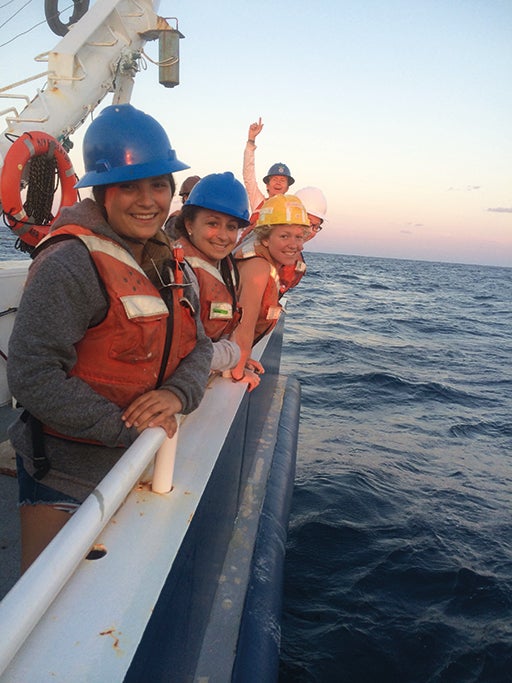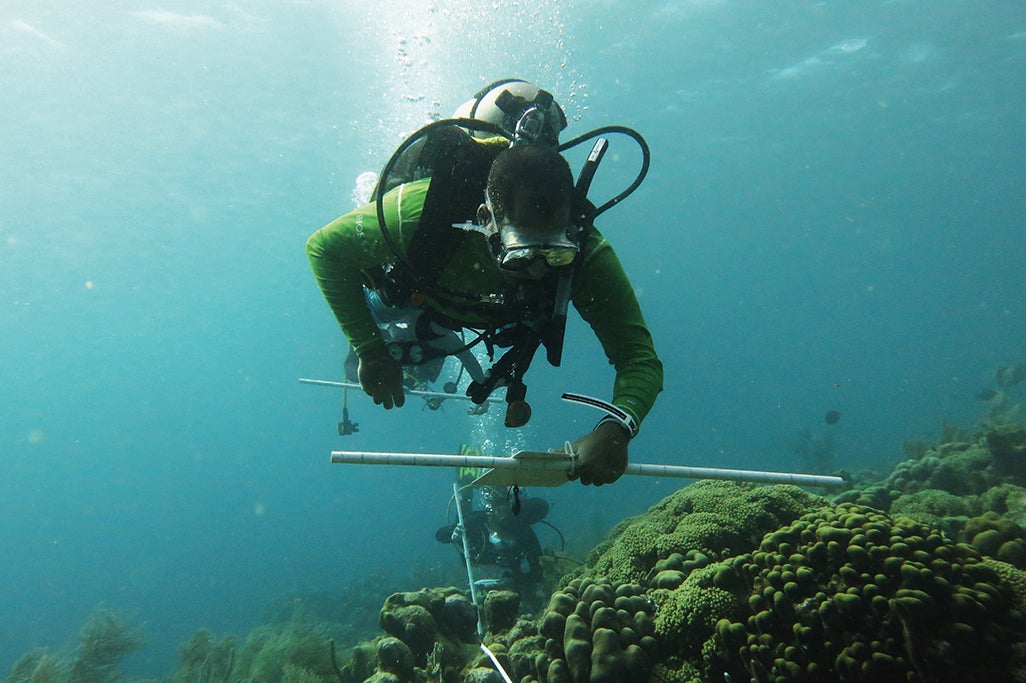The best time on a research cruise is at sunrise, according to Jillon McGreal. As a marine technician for the Bermuda Institute of Ocean Sciences, the 2014 SURF has become the go-to person between scientists and ship crew, troubleshooting anything from sample equipment launches to wireless internet.

“You do a lot,” says McGreal, who graduated from the University of Rhode Island in 2015 with a bachelor’s in marine biology. “My main job is taking care of scientific equipment, but we are in charge of safety on the deck, securing supplies at shore, and even getting toilet paper.”
“I like being awake when the sun comes up, but our espresso machine is key!”
In 2014, McGreal researched Asterias forbesi, better known as the Atlantic sea star, alongside mentor Dr. Marta Gomez-Chiarri. The echinoderm at that time was being afflicted by a disease of which scientists knew little. The SURF experience, she says, helped her discover a passion for working on the sea.
“When you are designing an experiment, I feel like I am using the same part of my brain as when someone says, ‘Here is this fitting that needs to go with this other super crazy fitting, help me figure it out’,” the Chatham, N.Y. native explains. “You have to think about everything, which inspires me to be creative.”
After graduation, McGreal was unsure of her next step, not wanting to pursue a doctorate or work strictly in a lab. While working as a cruise technician aboard the R/V Siquliak through URI’s Graduate School of Oceanography in 2017, however, one of the crew members taught McGreal a skill which provided a spark for her career path: welding.
“I didn’t grow up with my dad having projects in the garage or cars or anything, and in the past I would not feel super confident doing more technical things,” she admits. “But learning how to weld gave me confidence to do more mechanical work.”
McGreal was accepted into the IYRS School of Technology & Trades in Newport and, after a year of working among the insides of ships, earned certificates in the installation and maintenance of marine systems, from engines and hydraulics to plumbing and electrical networks.
“We learned on systems which teachers would intentionally break,” explains McGreal. “We learned how to figure things out and make the equipment work again. One of the big takeaways for me was not being intimidated by things I haven’t seen before and being able to troubleshoot.”
Now, the former SURF student is not looking too far ahead into the future, enjoying much of her time as a reliable hand aboard the many research cruises organized by BIOS.
“I get to be involved with the science but work with my hands every day,” she says. “This is my dream job, and the ship is my home.”
Into the Real World

Steven Tadros didn’t want to become a lawyer or doctor, like his parents Mary and Oncy implored. Marine biology was the 2015 SURF’s passion. Now an ocean scientist for global environmental consultancy firm RPS, the Ashland, Mass., native counts his SURF experience as one of the most important.
“My parents emigrated from Egypt, so they are very traditional,” Tadros explains. “Being a marine biologist was kind of a joke to them at first, but now they know I am taking care of myself and are proud.”
In 2015, Tadros wanted more research experience in the field. Enter former SURF mentor Dr. Graham Forrester, who brought the then University of Rhode Island junior on board to study coral reef restoration in the British Virgin Islands.
“We would dive three to four times a day in five foot waters, where the conditions were tough when waves would take you from the coral,” recalls Tadros. “We were trying to create an innovative and cheap way to restore the reefs there.”
After his SURF project ended, Tadros continued to work alongside Forrester, a professor of natural resources science at URI, on coral reef restoration, presenting his work at two conferences. A friendship formed between the undergraduate and his mentor, a relationship which has been invaluable for Tadros as he navigates his career path.
“SURF gave me the opportunity to go out into the field, collect and analyze data, but I cannot express enough gratitude for putting me with Dr. Forrester,” he says. “He has been a great resource for me professionally.”
As an ocean scientist at RPS, Tadros trains organizations across the globe on the company’s software which models the effects of a potential oil spill, as well as help draft environmental impact statements for those groups. Looking to the future, the 2015 SURF has a wide-open road.
“I’m 24, so every week my mind changes about what I want to do,” says Tadros with a laugh. “Right now, I am building experience and making unbelievable connections. That’s a good thing.”

 RI NSF EPSCoR is supported in part by the U.S. National Science Foundation under EPSCoR Cooperative Agreements #OIA-2433276 and in part by the RI Commerce Corporation via the Science and Technology Advisory Committee [STAC]. Any opinions, findings, conclusions, or recommendations expressed in this material are those of the author(s) and do not necessarily reflect the views of the U.S. National Science Foundation, the RI Commerce Corporation, STAC, our partners or our collaborators.
RI NSF EPSCoR is supported in part by the U.S. National Science Foundation under EPSCoR Cooperative Agreements #OIA-2433276 and in part by the RI Commerce Corporation via the Science and Technology Advisory Committee [STAC]. Any opinions, findings, conclusions, or recommendations expressed in this material are those of the author(s) and do not necessarily reflect the views of the U.S. National Science Foundation, the RI Commerce Corporation, STAC, our partners or our collaborators.